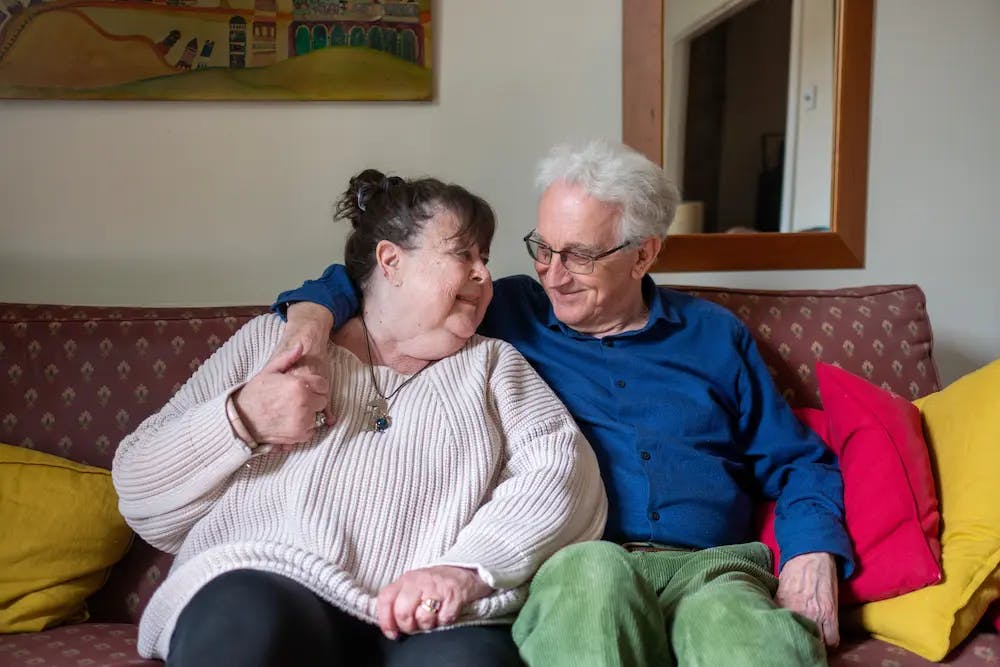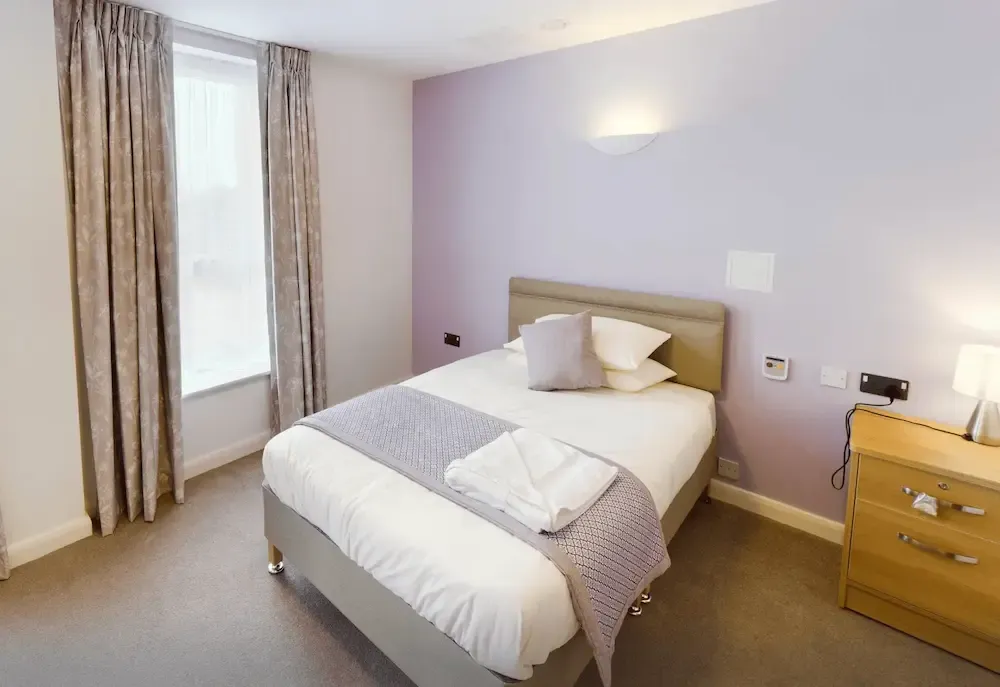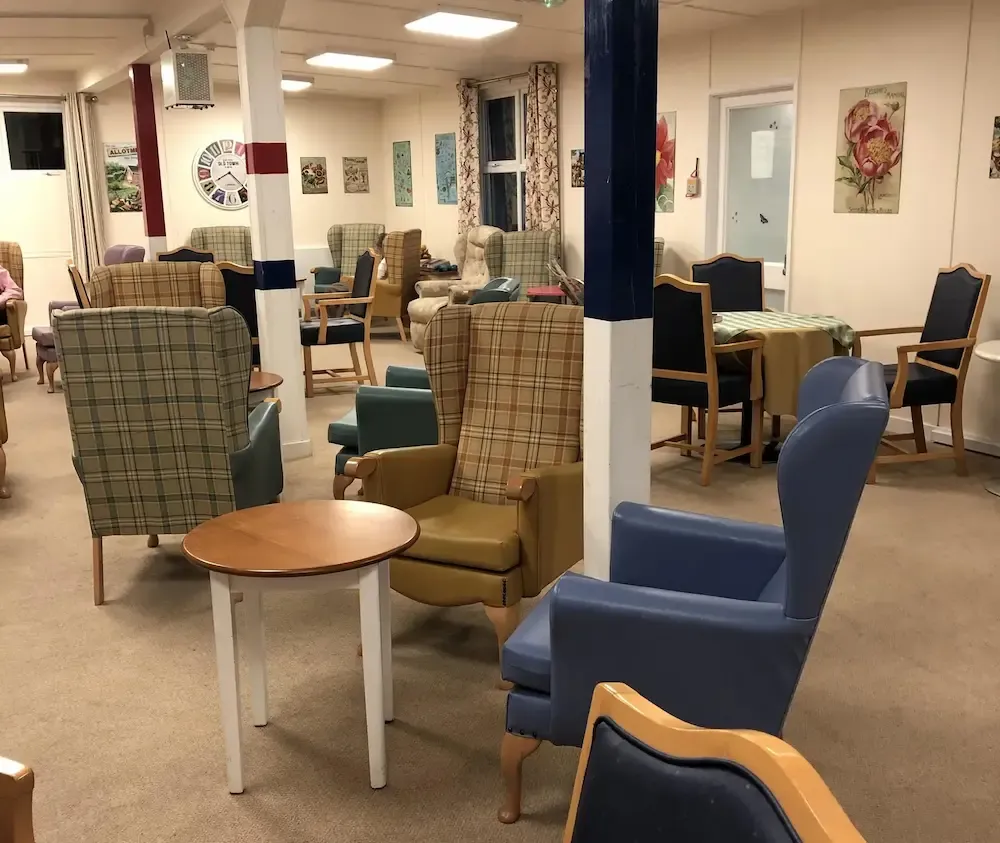Convalescent Care Homes | Postoperative Care and Recovery

Estimated Reading Time: 15 minutes
For most people, recovering from an illness is simply a case of allowing it to run its course. Unfortunately, some people will be left temporarily unable to care for themselves.
This is where convalescent care comes in - a type of short-term support provided by skilled professionals to those recovering from illnesses, operations and injuries. In essence, convalescent care homes help people get back on their feet, without having to stay in a hospital.
We’ve explained exactly what convalescent care is, along with where it can be provided, how long it can last, how much it costs and how to find convalescent care near you.
Need to find convalescent care fast?
Browse the best convalescent care homes.
In this article on convalescent care:
- What is convalescent care?
- Who needs convalescent care?
- What support is provided?
- Where is it provided?
- How long can convalescent care be provided for?
- Convalescent home and nursing home differences
- Convalescent care costs and funding options
- Postoperative care
- How to find a convalescent home
What is Convalescent Care?
Convalescent care is a temporary form of care that provides extra support if you’re recovering from an operation or illness. In a convalescent care home, personal care and assistance with daily tasks like laundry and cleaning are given, similar to a residential care home. Having fewer responsibilities allows residents to focus on their recovery.
People stay in a convalescent care home when they require routine support from care staff, doctors and nurses, but aren’t unwell enough to need a hospital. These types of homes are sometimes referred to as inpatient rehabilitation facilities.
Convalescent homes are far more common than they used to be, with modern versions often integrated within nursing homes. Like nursing homes, convalescent homes are staffed by trained medical workers.

Who Needs Convalescent Care?
People who are able to recover from whatever caused them to need additional support in the first place are well suited to convalescent care.
Put simply, convalescent care is aimed at people who need temporary, short-term care so they can return to full health and no longer regularly need this care.
The following are other examples of why somebody might need convalescent care:
Post-surgery recovery
Hospital discharge after a fall or similar accident (this may fall within one of the Discharge to Assess pathways)
Acute illnesses
Chronic diseases
What Support is Provided?
A comprehensive plan of care and recovery is tailor-made for each resident. While every home is different, most will offer the following types of therapy:
Counselling
Psychologists will help you develop motivational skills, positive attitudes and coping skills to improve mental wellbeing.
Physical therapy
Physiotherapists devise exercise plans and activities to help you regain strength, coordination and motor skills.
Speech therapy
Speech therapists use exercises and routines to help you regain useful communication skills.
Occupational therapy
If you have physical, sensory or motor function problems, an occupational therapist can help you maintain and develop functional skills for day-to-day living.

Convalescent care homes can also provide their residents support with:
Meals and meal preparation
Administering medication
Incontinence care
Laundry
Other forms of personal care like bathing and dressing
And much, much more
Where is it Provided?
Convalescent care is predominantly provided in two different locations; within your own home or through a care home.
There are pros and cons to each of these options. Remaining within familiar surroundings has obvious benefits for mental health, while a convalescent home providing this type of specialist care will often be better equipped to support your loved one’s needs.
Below, we’ve discussed both of these in more detail.
At home
Some facilities offer convalescent care to those who would rather undergo this short-term treatment in their own home. Recovery is all about comfort and feeling relaxed - with little feeling more comfortable and relaxing than where you live.
Here, a skilled carer would visit your home once or twice a day. During these visits, they’ll administer any therapy and treatment while assisting you around the house. This home care will be provided until you feel well enough to cope without support.
Some care providers will even be able to provide live-in convalescent care if necessary. Live-in convalescent care allows people to return to their own home following a hospital stay.

In a convalescent home
When short-term convalescent care is provided in a care home or nursing home, 24/7 support can be provided where necessary. The benefit of having your rehabilitation in this setting is that nursing care is given in a safe and supportive environment by skilled and fully trained members of staff.
Generally, convalescent care is seen as better aiding recovery from an illness or operation when done in a care home. This is because any required equipment is readily available and experienced staff members will always be on hand.
How Long Can Convalescent Care Be Provided For?
How long you’ll stay in a convalescent home is entirely dependent on the severity of your illness or injury. Comfort is a huge priority within convalescent care, so you’re unlikely to come across any rushed treatment plans.
Residents will often remain within short-term convalescent care for just a few days or weeks - a short-term support option - or several months. Either way, you or your loved one will be given the peace of mind that any personal care needs are being taken care of while on the road to recovery.
The end goal is that the recipient will fully recover and eventually be able to live independently again. So, if a person is living with a condition that isn’t going to improve after the period of support then this may not be the right type of care for them.
Convalescent Home and Nursing Home Differences
It’s easy to get convalescent homes and nursing homes mixed up, especially when considering that many nursing homes now offer this type of post-operative care. Though people often refer to these two care types interchangeably, their facilities and exactly what they offer are quite different.
Short-term vs long-term care
Nursing homes are typically geared toward offering long-term care, whereas convalescent care is designed for short-term rehabilitation.
Rehabilitation vs dependence
Nursing home residents are often unable to live independently, so they require more support throughout the day, including assistance with daily care tasks like bathing, eating, getting in and out of bed, getting dressed and so on. On the other hand, residents requiring convalescent care services are only there to recover from surgery or an illness.
As a result, the care needs of a convalescent resident are usually much less. Once the stay is over, you or your loved one will return home and re-commence living independently.
Daily schedule
The third way that convalescent homes differ from nursing homes is the residents' schedules. Because convalescent care is a form of short-term support, any facilities and services offered are temporary, with yourself or your loved one spending large chunks of their day in therapy.
In nursing homes however, anybody living there is a permanent resident. As such, their time will be spent maintaining a good level of health, rather than actively working towards recovery and independence in care.
Costs & Funding Options
Generally, your local authority will recommend a convalescent home that falls within your personal budget. However, if you’d prefer to enter a more expensive home, these additional fees could be paid by yourself, a family member or a friend through a top up fee.
If this care has been organised by a local authority as part of a short-term rehabilitation package, the first six weeks of convalescent care should be free. This is known as intermediate care. This will either be entirely funded by the local authority or part-funded by the local authority and the NHS.
Taking a financial assessment may open up some additional avenues when it comes to getting help from your local authority with care home funding.
Similarly, the cost of receiving convalescent care in your own home will vary, depending on the care provider and the level of support you need. You’ll most likely pay for care support on an hourly basis, so it’s important to consider the best option for your support needs and budget.
Postoperative Care
Postoperative care is received after a surgical procedure. Generally speaking, the type of postoperative care you require will depend on the type of surgery you've had, along with your history of health.
Postoperative care begins immediately after surgery and lasts for the duration of a hospital stay. Depending on circumstances, postoperative care can also be largely carried at home.
Postoperative care is similar to convalescent care, but differs as it involves slightly more care. A common example of postoperative care is after a major surgical procedure like a hip replacement operation.
How to Find a Convalescent Home
You can find convalescent facilities in a large number of nursing homes and other care homes throughout the UK. You can use our care directory to find a home offering convalescent care near you - free of charge!
You can also request a free list of care homes from our Care Experts. They’ll send you suitable options matching your needs, including your budget and the care type required.
If you know in advance that you or a loved one will require convalescent care, we recommend contacting a home offering this type of care to reserve a bed. However, if the need for convalescent care suddenly occurs, we advise you to ring different nearby care homes to find out if they have any availability. You can also contact Lottie for bespoke, free support from our Care Experts.
To get you started, we’ve rounded up some of the best convalescent homes throughout the UK below. Each of our home listings states whether they provide convalescent care.
Groveland Park in Bexleyheath, London
Groveland Park Care Home is situated in the London town of Bexleyheath and provides several types of care in a picturesque setting, including residential and dementia care. Short-term support is also available, including convalescent and respite care. They utilise an all-inclusive pricing model so everything is rolled into one single, simple weekly fee.

Residents love spending time in facilities such as the cinema room, the bistro-style restaurant and bar, the tranquil gardens, and the hair and beauty salon. Various social activities are also organised by the home’s in-house activity coordinator, and some of the most popular include jazz nights, movie evenings, and wine-tasting sessions.
| Learn more about Groveland Park: | |
|---|---|
| Type(s) of Care Offered | The main types offered are residential, dementia, and respite care |
| Cost of Care | Care starts from £1,600 per week |
| Are Bills Included in the Price? | Yes |
| Care Quality Commission Rating | Outstanding |
| Facilities | A bar, a cinema room, a café/restaurant, communal and private dining spaces, lovely gardens, a hair and beauty salon, a library and reading room, a meditation space, a spa, and outdoor terracing |
| Are There En Suite Facilities? | All bedrooms have an en-suite bathroom or wetroom |
| Number of Beds | 55 |
| Is the Home Purpose-Built? | Yes |
Are you interested in viewing Groveland Park?
For availability and pricing, call 01322 952337.
Belong Atherton in Atherton, Greater Manchester
One of the region’s most luxurious homes, Belong Atherton Care Home is situated in the heart of Atherton, Greater Manchester. This modern home comprises six households, each offering 24/7 support and thoughtfully decorated spacious en-suite bedrooms. This vibrant community also has shared facilities like a bistro-style restaurant, a gym, a hair and beauty salon, and a serene dementia-friendly garden.

A range of specialist care options are available at Belong Atherton, and each of these is given by expert carers and registered nurses. This includes convalescent, mental health, palliative, and physical disability care, along with day care services. If your loved one is recovering after an illness, injury, or operation, residential and nursing care are both given here.
| Learn more about Belong Atherton: | |
|---|---|
| Type(s) of Care Offered | The main types offered are residential, nursing, dementia, and respite care |
| Cost of Care | Care starts from £1,480 per week |
| Are Bills Included in the Price? | No |
| Care Quality Commission Rating | Outstanding |
| Facilities | An activity room, a bar, a café/restaurant, a cinema room, a communal dining space, a family room, tranquil gardens, a gym, a hair and beauty salon, a library and reading room, a quiet space, and outdoor terracing for relaxation |
| Are There En Suite Facilities? | All bedrooms have an en-suite bathroom or wetroom |
| Number of Beds | 73 |
| Is the Home Purpose-Built? | Yes |
| Care Home Operator | Belong Villages |
Are you interested in viewing Belong Atherton?
For availability and pricing, call 01204 961934.
Bramley Court in Histon, Cambridge
Situated in the peaceful village of Histon, Bramley Court Care Home blends ‘Outstanding’ rated care (the highest rating available) with a warm and welcoming setting. Each day is different for residents, thanks to an experienced activity team that organises engaging shopping trips and other days out, along with a range of activities within the home.

Whatever care you require, including short-term convalescent care, you’ll be looked after with the individuality you deserve through tailored, person-centred care. Also available are residential, dementia, nursing, palliative, and physical disability care.
| Learn more about Bramley Court: | |
|---|---|
| Type(s) of Care Offered | The main types offered are residential, nursing, dementia, and respite care |
| Cost of Care | Care starts from £1,800 per week |
| Are Bills Included in the Price? | No |
| Care Quality Commission Rating | Outstanding |
| Facilities | An activity room, a bar, a café/restaurant, a cinema room, a communal dining space, calming gardens, a gym, a hair and beauty salon, a library and reading room, a quiet area, and outdoor terracing |
| Are There En Suite Facilities? | 93% of bedrooms have an en-suite bathroom or wetroom |
| Number of Beds | 72 |
| Is the Home Purpose-Built? | Yes |
| Care Home Operator | Carebase |
Are you interested in viewing Bramley Court?
For availability and pricing, call 01223 679856.
Perry Manor in Worcester
Perry Manor Care Home is another ‘Outstanding’ rated home. You’ll find Perry Manor in the stunning cathedral city of Worcester, just east of the city centre. The dedicated team at this home ensures every resident receives care tailored to their specific needs.

Along with high-quality care, several additional services are available, including support from a dentist, chiropodist, and optician. Residents love participating in activities like gardening, baking, arts and crafts, and outings in the home’s own minibus. Relaxing in facilities such as the coffee shop, bar, cinema room, and hair and beauty salon are also popular.
| Learn more about Perry Manor: | |
|---|---|
| Type(s) of Care Offered | The main types offered are residential, nursing, dementia, and respite care |
| Cost of Care | Care starts from £1,459 per week |
| Are Bills Included in the Price? | Yes |
| Care Quality Commission Rating | Outstanding |
| Facilities | An activity room, a café/restaurant, a cinema room, communal and private dining spaces, wonderful gardens, a hair and beauty salon, a library and reading room, a quiet area, and outdoor terracing |
| Are There En Suite Facilities? | All bedrooms have an en-suite bathroom or wetroom |
| Number of Beds | 82 |
| Is the Home Purpose-Built? | Yes |
| Care Home Operator | Care UK |
Are you interested in viewing Perry Manor?
For availability and pricing, call 01905 975305.
Connaught Court in Fulford, York
A distinguished home in the heart of Yorkshire, Connaught Court Care Home is situated in the historic village of Fulford on the outskirts of York. The team at Connaught Court offer a superb standard of residential, dementia, short-term respite, convalescent, and palliative care, along with specialist physiotherapy services.

The dedicated activity team ensures vibrant lifestyles for residents, with diverse experiences that often encourage independence like fitness sessions, gardening, movie nights, and arts and crafts. Most carers in this home have an NVQ/QCF in Health and Social Care or are working towards this, so you can rest assured your loved one will be in safe hands while they recover.
| Learn more about Connaught Court: | |
|---|---|
| Type(s) of Care Offered | The main types offered are residential, nursing, dementia, and respite care |
| Cost of Care | Care starts from £1,163 per week |
| Are Bills Included in the Price? | No |
| Care Quality Commission Rating | Outstanding |
| Facilities | An activity room, a communal dining space, a room for spending time with family, lovely gardens, and an area for peace and quiet |
| Are There En Suite Facilities? | 96% of bedrooms have an en-suite bathroom or wetroom |
| Number of Beds | 94 |
| Is the Home Purpose-Built? | Yes |
| Care Home Operator | The Royal Masonic Benevolent Institution Care Company |
Are you interested in viewing Connaught Court?
For availability and pricing, call 01904 935646.
The Manor in Edinburgh
You’ll find The Manor Care Home in the heart of Edinburgh, just a short journey from local attractions that include peaceful parks, Hermitage of Braid, and Edinburgh Zoo.

This is a truly stunning home. Classic interiors are found throughout, including in the bistro-style communal dining space and the social lounges. Meanwhile, every bedroom is spacious and wonderfully furnished, while the large garden area is the perfect place to stroll or relax during the warmer months.
| Learn more about The Manor: | |
|---|---|
| Type(s) of Care Offered | The main types offered are residential, nursing, dementia, and respite care |
| Cost of Care | Care starts from £1,868 per week |
| Are Bills Included in the Price? | No |
| Care Inspectorate Rating | Very good |
| Facilities | An activity room, a café/restaurant, a cinema room, a communal dining space, idyllic gardens, a hair and beauty salon, and a quiet area |
| Are There En Suite Facilities? | All bedrooms have an en-suite bathroom or wetroom |
| Number of Beds | 74 |
| Is the Home Purpose-Built? | Yes |
| Care Home Operator | Caring Homes |
Are you interested in viewing The Manor?
For availability and pricing, call 01313 817619.
Thornfield in Seaton, Devon
Situated on the edge of Seaton in beautiful Devon, Thornfield Care Home can be found near the Jurassic Coast. This idyllic location is perfect for older adults looking for care in later life, with services such as convalescence, day care, respite care, dementia care, and nursing care all available.

We love the facilities at Thornfield, especially the tranquil garden space and The Snug Inn communal area. There are also spacious en-suite bedrooms, a communal dining room, a hair and beauty salon, and an activity room. With a dedicated activity team, residents are regularly taken on trips in the home’s minibus, allowing them to experience the best Devon has to offer.
| Learn more about Thornfield: | |
|---|---|
| Type(s) of Care Offered | The main types offered are residential, dementia, and respite care |
| Cost of Care | Care starts from £1,350 per week |
| Are Bills Included in the Price? | No |
| Care Quality Commission Rating | Outstanding |
| Facilities | An activity room, a bar, a communal dining space, idyllic gardens, a hair and beauty salon, a library and reading room, and a quiet area |
| Are There En Suite Facilities? | 96% of bedrooms have an en-suite bathroom or wetroom |
| Number of Beds | 52 |
| Is the Home Purpose-Built? | No |
Are you interested in viewing Thornfield?
For availability and pricing, call 01404 519476.
Loading FAQs...



